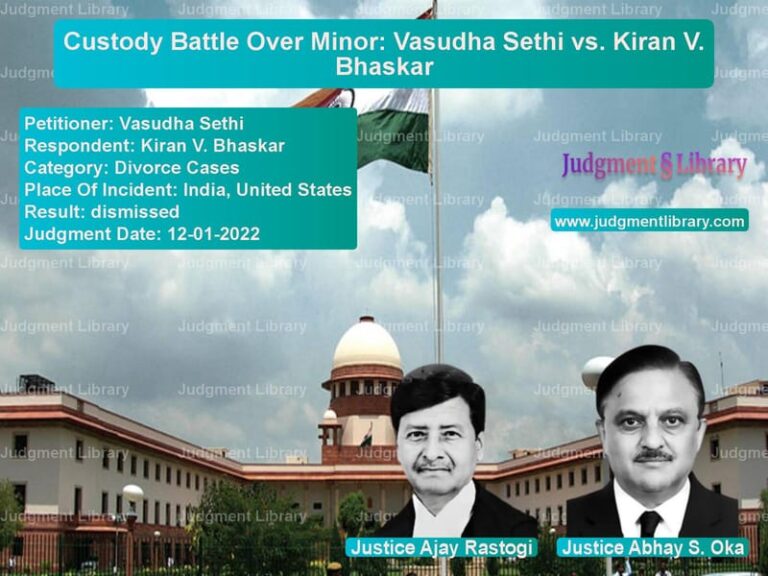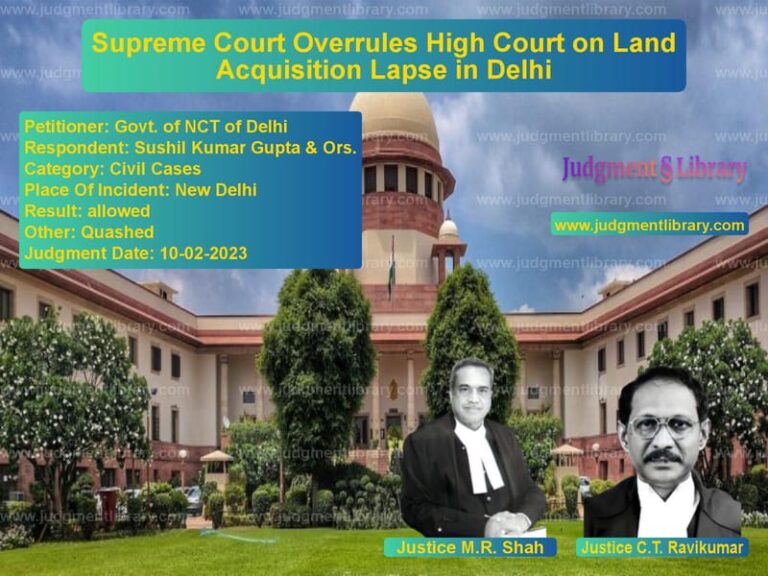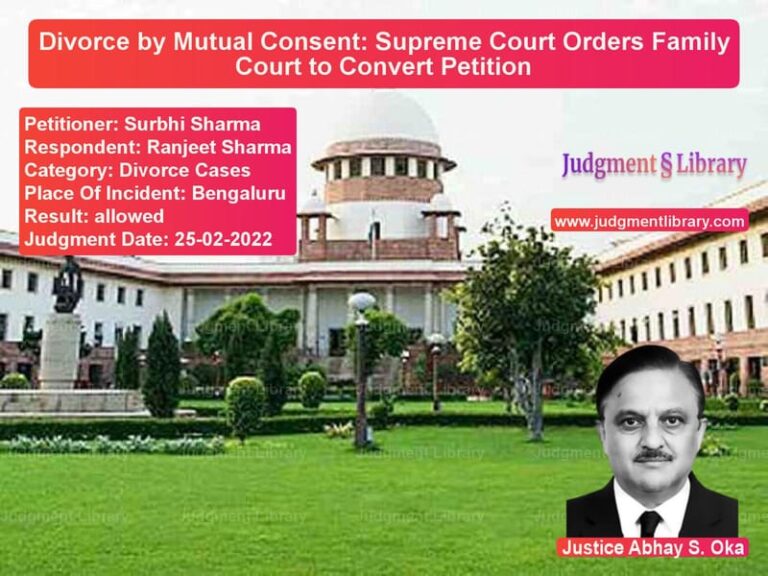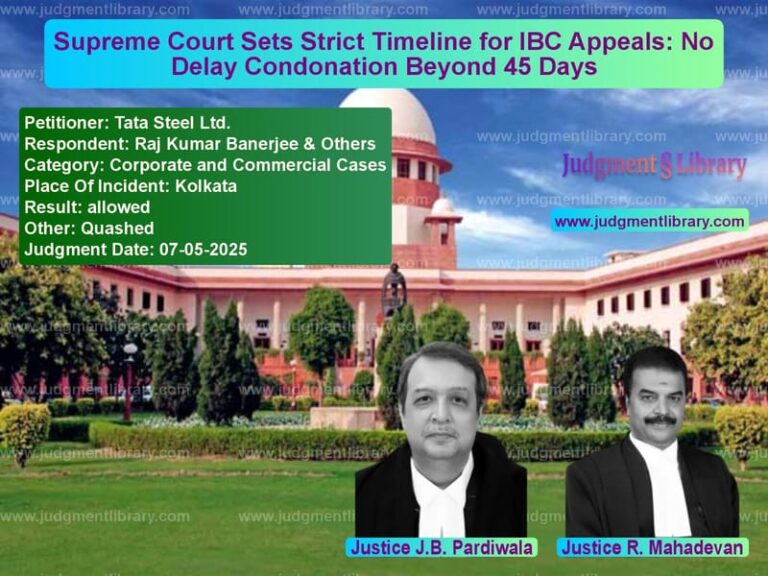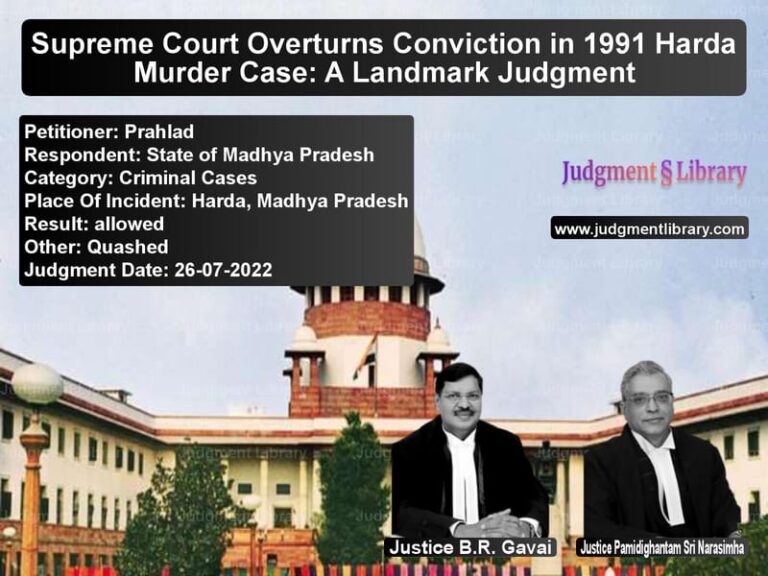Arbitration vs. Insolvency: Supreme Court Rules on Limitation and Re-Filing of Arbitration Applications
The Supreme Court of India recently delivered a landmark ruling in M/S HPCL Bio-Fuels Ltd. vs. M/S Shahaji Bhanudas Bhad, clarifying key issues related to arbitration proceedings and insolvency disputes. The judgment focused on whether a fresh arbitration application could be filed after a prior withdrawal and whether proceedings under the Insolvency and Bankruptcy Code (IBC) could be used to extend limitation periods for arbitration claims.
Background of the Case
The case arose from a contractual dispute between HPCL Bio-Fuels Ltd. (appellant) and M/S Shahaji Bhanudas Bhad (respondent). The dispute related to the supply and erection of machinery for sugar processing units. The respondent claimed unpaid dues of ₹18.12 crore and invoked arbitration under Clause 14 of the contract. After facing delays and disputes over performance, the respondent initially filed for arbitration but later withdrew the petition and pursued insolvency proceedings under the IBC.
Legal Issues Raised
- Whether a fresh arbitration application under Section 11(6) of the Arbitration and Conciliation Act, 1996 (the “Act”) could be filed after the unconditional withdrawal of a prior application.
- Whether the arbitration claim was time-barred under Article 137 of the Limitation Act, 1963.
- Whether the time spent in pursuing IBC proceedings could be excluded under Section 14 of the Limitation Act.
- Whether delay in filing the fresh arbitration application could be condoned under Section 5 of the Limitation Act.
Arguments Presented
Appellant’s Arguments
- The fresh arbitration application was not maintainable since the respondent had previously withdrawn an arbitration petition without seeking liberty to re-file.
- The arbitration claim was time-barred since the respondent failed to file within three years of the dispute arising in 2014.
- The IBC and arbitration proceedings serve distinct purposes, and the time spent in IBC proceedings should not be excluded under Section 14 of the Limitation Act.
- The respondent made a conscious decision to abandon arbitration in favor of IBC proceedings and should not be allowed to restart arbitration.
Respondent’s Arguments
- The respondent had pursued the IBC process in good faith, believing it to be an appropriate remedy.
- The Supreme Court had earlier granted liberty to pursue arbitration, making the fresh application maintainable.
- The time spent in IBC proceedings should be excluded under Section 14 of the Limitation Act as the proceedings were pursued diligently.
- Even if limitation applied, the delay should be condoned under Section 5 of the Limitation Act.
Supreme Court’s Analysis
1. Maintainability of the Fresh Arbitration Application
The Supreme Court ruled that once an arbitration application under Section 11(6) is withdrawn without seeking permission to re-file, a fresh application for the same dispute is not maintainable. The Court held:
“Extending the principles of Order 23 Rule 1 of the CPC, a fresh application cannot be filed once an earlier arbitration application is withdrawn unconditionally.”
2. Limitation Period for Filing Arbitration Claims
The Court reaffirmed that arbitration applications are governed by a three-year limitation period under Article 137 of the Limitation Act. Since the dispute arose in 2014, the limitation period expired in 2017, making the claim time-barred.
“The clock for limitation starts ticking from the date of the cause of action. The second arbitration application, filed in 2022, was well beyond the permissible period.”
3. Exclusion of IBC Proceedings Under Section 14 of the Limitation Act
The Court rejected the respondent’s argument that the time spent in IBC proceedings should be excluded for computing limitation. It held:
“Insolvency proceedings and arbitration proceedings seek different remedies. The IBC process is a resolution mechanism, not a debt recovery mechanism. Section 14 of the Limitation Act does not apply to proceedings seeking fundamentally different reliefs.”
4. Condonation of Delay Under Section 5 of the Limitation Act
While Section 5 of the Limitation Act allows condonation of delay for ‘sufficient cause,’ the Court found that the respondent had deliberately abandoned arbitration in favor of IBC. The Court observed:
“A conscious decision was made to withdraw the arbitration petition to pursue insolvency. The delay in refiling arbitration proceedings was not due to a bona fide mistake but a deliberate legal strategy.”
Final Judgment
The Supreme Court allowed the appeal and set aside the Bombay High Court’s order appointing an arbitrator. The key rulings were:
- The fresh arbitration application was not maintainable as the first application was withdrawn unconditionally.
- The arbitration claim was time-barred under Article 137 of the Limitation Act.
- The time spent in IBC proceedings could not be excluded under Section 14 of the Limitation Act.
- The delay in filing the arbitration claim could not be condoned under Section 5 of the Limitation Act.
With this ruling, the Court reinforced the principle that parties must adhere to procedural rules and cannot switch between legal forums in an attempt to bypass limitation laws.
Implications of the Judgment
This decision has far-reaching consequences for arbitration and insolvency law:
- Clarity on Limitation in Arbitration: The ruling reinforces that arbitration applications must be filed within three years of the dispute.
- Finality in Withdrawal of Cases: Parties cannot refile arbitration applications once they have withdrawn a prior petition unconditionally.
- Distinction Between IBC and Arbitration: The decision affirms that insolvency proceedings and arbitration serve different legal purposes.
- Prevention of Procedural Abuse: The ruling discourages forum shopping and ensures that legal proceedings follow due process.
The judgment serves as a critical precedent in ensuring that parties do not misuse legal remedies to circumvent limitation periods and procedural requirements.
Petitioner Name: M/S HPCL Bio-Fuels Ltd..Respondent Name: M/S Shahaji Bhanudas Bhad.Judgment By: Justice Dhananjaya Y. Chandrachud, Justice J.B. Pardiwala, Justice Sanjay Kumar.Place Of Incident: Bombay, Maharashtra.Judgment Date: 07-11-2024.
Don’t miss out on the full details! Download the complete judgment in PDF format below and gain valuable insights instantly!
Download Judgment: ms-hpcl-bio-fuels-l-vs-ms-shahaji-bhanudas-supreme-court-of-india-judgment-dated-07-11-2024.pdf
Directly Download Judgment: Directly download this Judgment
See all petitions in Arbitration Act
See all petitions in Enforcement of Awards
See all petitions in Dispute Resolution Mechanisms
See all petitions in Institutional Arbitration
See all petitions in Judgment by Dhananjaya Y Chandrachud
See all petitions in Judgment by J.B. Pardiwala
See all petitions in Judgment by Sanjay Kumar
See all petitions in allowed
See all petitions in Quashed
See all petitions in supreme court of India judgments November 2024
See all petitions in 2024 judgments
See all posts in Arbitration and Alternate Dispute Resolution Category
See all allowed petitions in Arbitration and Alternate Dispute Resolution Category
See all Dismissed petitions in Arbitration and Alternate Dispute Resolution Category
See all partially allowed petitions in Arbitration and Alternate Dispute Resolution Category



